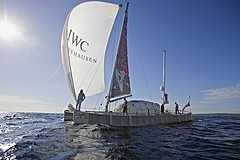UT Architecture Grad Makes Waves In Boat Made of Recycled Plastic Bottles

Recycled plastic sounds great and all. But would you trust your life to a boat made of the stuff?
An amazing UT architecture grad has proven you should.
Nathaniel Corum, MAr '01, is doing noteworthy work in humanitarian design. A new and growing field, it serves people who have been marginalized or are in great need all over the world. Corum has worked with everyone from the Navajo in Arizona to the earthquake survivors of Haiti.
Among his latest and most attention-getting projects was designing the cabin of the Plastiki. The boat, made of 12,500 recycled plastic bottles, finished sailing safely across the Pacific in July. Its 130-day journey was planned to raise awareness about the earth's veritable ocean of garbage.
Corum's home base is San Francisco, where he works with the nonprofit Architecture for Humanity. But he describes himself as nomadic, moving among the people for whom he is designing.
"The richer the dialogue you have with the people you're working with, the better," he told the New York Times in a recent profile. "I spend lots of time with them and learn so much, especially from people living close to the land. Humanitarian design isn't the new imperialism, it's the new compassion."
Faculty and staff at UT's School of Architecture have kept tabs on a student they remember as dynamic. Corum was drawn to the school for the work it has been doing in sustainability, professor Michael Garrison says, and he advanced that work while on the Forty Acres. He went on to win both a Rose fellowship and a Fulbright scholarship.
Many architects are most interested in artful design, Garrison says. Corum was different. "He was looking at the aesthetics of architecture being more than skin deep — he was interested in how buildings perform," says Garrison, who advised Corum on his thesis. "He believed a building couldn't look good if it harmed the earth. But a building wouldn't perform unless it looked good."
It is Corum's dedication, work ethic, and above all, formidable networking skills that have made him such a mover and shaker so early in his career, the professor believes.
"He was always the leader. Whether it was learning about straw bales or adobe, he found out who was working in that area and made a connection with them," Garrison says. "He's put groups together before that didn't know where to go or who to talk to. He makes things happen."
Photo courtesy of the Plastiki crew





